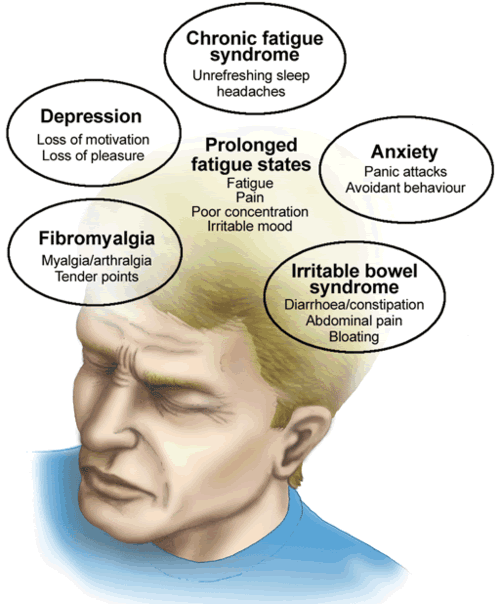
Chronic fatigue syndrome (CFS) is a complex disorder characterized by extreme fatigue. The fatigue may worsen with physical or mental activity but does not improve with rest. The cause of chronic fatigue syndrome is difficult to pinpoint; it could be multifactorial— ranging from viral infections to psychological stress or as a result of a combination of any of these. It is difficult to diagnose and would require a series of tests to rule out other causes which may present with the same spectrum of symptoms.
Disease Presentation
The affected individual may present with fatigue, memory loss or unable to concentrate. They may also present with a sore throat, flu-like symptoms, feeling dizzy, palpitations, headaches, muscle or joint pains, sleep which does not refresh them. Swollen glands in the neck or armpits. However, the most classical presentation is extreme tiredness which lasts for more than one day especially after physical exercise or mental strain. This is called as post-exertional malaise. The fatigue may last for more than six months is another classical feature of this disorder. A full night sleep does not relieve the fatigue and pain. Orthostatic intolerance which means that patients feel better when lying down compared to standing is one of the symptoms too.
If you have any of the above symptoms, it would be better to approach your doctor at the earliest. This can facilitate early diagnosis and quick initiation of treatment modalities.

What can cause CFS?
Some individuals are more prone to this disorder, why this happens is still unknown. Trigger factors could be viruses like Epstein Barr and other related viruses. However, no definite correlation has been established as yet. The immune system may be deranged and affected in patients with CFS. Hormonal imbalance has been implicated with abnormal levels of those produced by the pituitary, hypothalamus and adrenal glands.
Who is at Risk :
It commonly affects people in their 40’s or 50’s with a preponderance of women. Those who are unable to cope with stress may be more affected. A genetic component is also a possible causative factor.
Diagnosing CFS:
No specific tests exist and diagnosis is purely done based on the symptoms, ruling out other disorders before arriving at a diagnosis. However, the doctor may order blood and urine tests to rule out other ailments before arriving at a diagnosis of CFS. Sleep disorders can cause fatigue; sleep studies can rule out insomnia, obstructive sleep apnoea and restless leg syndrome. Fatigue can also present in diseases such as anemia, diabetes and hypothyroid, these need to be ruled out too. Vitamin B12 and Vitamin D deficiencies can present as fatigue, and these are common ailments which need to be considered too. An exercise stress test can evaluate your heart and lung capacity and rule out any heart and lung ailments. Patients need to be very patient till a working diagnosis is made.
Treating CFS:
The aim of treatment is to relieve symptoms. Medications to relieve pain, fatigue and sleep disorders may need to be prescribed. A low dose of antidepressants may be used to relieve pain and sleep disorders. A balanced diet of fruits, vegetables and nuts may help. Certain triggers like sugar, caffeine, and alcohol should be avoided.
Cognitive behavioral therapy (CBT) which includes multiple counseling sessions may help. This kind of therapy can be considered as a talking therapy; it will help you to come to terms and accept the ailment and symptoms which are associated. When the locus of control is internal, it will make you feel good and help in managing the disease better and improve the overall outlook. This therapy helps in changing the dysfunctional thinking and behavior
Graded exercise therapy (GET): Initially determine what exercise type suits you. Gradually start with stretching and increase exercise which is of incremental nature and also the intensity. The goal is to attain an exercise capability of 30 minutes per day. Exercises recommended are cycling, swimming, walking and stretching. The role of alternative medicine therapies in CFS have been tried, hydrotherapy, stretching, and acupuncture may help to some extent. It is difficult to ascertain whether these truly work.
Complications:
If left untreated it could lead to depression, sickness absenteeism from work can lead to isolation and may lead to lifestyle restrictions, and it may be difficult to carry out day to day activities.
Outlook:
Over time most patients with CFS get better. However, full recovery may not happen in all the patients. Symptoms may wax and wane. Children and younger adults may make a complete recovery. Certain major lifestyle changes may need to be made. CFS can also take a toll on your emotional well being. Constructive continuous family support is of great help. It would also be helpful to talk to other patients afflicted with this disease. Their experience in managing the disease may be useful and beneficial. Joining a support group would be a positive step in the right direction.



